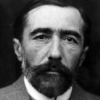Joseph Conrad

Joseph Conrad
Joseph Conradwas a Polish-British writer regarded as one of the greatest novelists to write in the English language. He joined the British merchant marine in 1878, and was granted British nationality in 1886. Though he did not speak English fluently until he was in his twenties, he was a master prose stylist who brought a non-English sensibility into English literature. He wrote stories and novels, many with a nautical setting, that depict trials of the human spirit in the midst...
NationalityPolish
ProfessionNovelist
Date of Birth3 December 1857
CountryPoland
A work that aspires, however humbly, to the condition of art should carry its justification in every line.
The artist appeals to that part of our being which is not dependent on wisdom; to that in us which is a gift and not an acquisition-and therefore, more permanently enduring. He speaks to our capacity for delight and wonder, to the sense of mystery surrounding our lives; to our sense of pity, and beauty and pain.
All creative art is magic, is evocation of the unseen in forms persuasive, enlightening, familiar and surprising.
The end (goal) of art is to figure the hidden meaning of things and not their appearance; for in this profound truth lies their true reality, which does not appear in their external outlines.
An artist is a man of action, whether he creates a personality, invents an expedient, or finds the issue of a complicated situation.
[The artist] speaks to our capacity for delight and wonder, to the sense of mystery surrounding our lives; to our sense of pity, and beauty, and pain; to the latent feeling of fellowship with all creation--and to the subtle but invincible conviction of solidarity in dreams, in joy, in sorrow, in aspirations, in illusions, in hope, in fear…which binds together all humanity--the dead to the living and the living to the unborn.
All creative art is magic , is evocation of the unseen in forms persuasive, enlightening, familiar and surprising, for the edification of mankind , pinned down by the conditions of its existence to the earnest consideration of the most insignificant tides of reality .
The air of the New World seems favorable to the art of declamation.
There is a subtle and unmistakable touch of love and pride, beyond mere skill, almost an inspiration which gives to all work that finish which is almost art - which is art.
Only in men's imagination does every truth find an effective and undeniable existence. Imagination, not invention, is the supreme master of art as of life.
Any work that aspires, however humbly, to the condition of art should carry its justification in every line.
History repeats itself, but the special call of an art which has passed away is never reproduced. It is as utterly gone out of the world as the song of a destroyed wild bird.
The artist in his calling of interpreter creates because he must. He is so much of a voice that, for him, silence is like death
A historian may be an artist too, and a novelist is a historian, the preserver, the keeper, the expounder, of human experience.